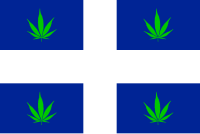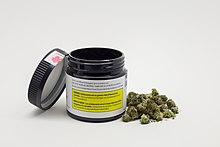
Cannabis in Quebec became legal when the national Cannabis Act went into force on 17 October 2018. Cannabis in Canada has been legal for medicinal purposes since 2001 under conditions outlined in the Marihuana for Medical Purposes Regulations, later superseded by the Access to Cannabis for Medical Purposes Regulations,[1] issued by Health Canada and seed, grain, and fibre production was permitted under licence by Health Canada.[2]
The federal Cannabis Act, legalizing cannabis for recreational use, came into effect on 17 October 2018.[3][4] Each province and territory set its own laws for various aspects, such as the legal age, whether householders can grow cannabis and the method of retail sales.[5][6]
Legalization of recreational marijuana[edit]

During the planning stages, the Société québécoise du cannabis was to be the only legal entity to transport or sell cannabis at the retail level. In contrast to the common age minimum of 19 in most provinces, in Quebec the age limit would be 18, later raised to 21. The new government justified increasing the age requirement out of concern for the effects cannabis has on the still-developing brain of young adults under 21. Critics however argue that the law change is unwarranted because those between the ages of 18 and 21 or even through age 25 are the biggest consumers of marijuana and if they are denied access to legal dispensaries they will turn to the unregulated black market. It is also incongruous with the age limit for other legal substances since one needs to be only 18 years of age to buy alcohol, tobacco, and vaping products in Quebec and is the age of majority.[7] Under the newly elected Coalition Avenir Québec government, the Deputy Minister for Health in October 2018, Lionel Carmant announced that the Government will tighten the rules on cannabis consumption, including increasing the legal age to consume to 21 from 18.[8][9] Also home-growing would not be permitted.[10]
Twelve Société québécoise du cannabis stores opened on October 17, 2018; by March 2022, this had increased to 87 retail locations throughout the province.[11] A full 150 different products are sold, in dried, fresh or oil format, but not edibles, as well as accessories such as vaporizers. On-line sales from the SQDC web site also commenced on 17 October. Adults may possess up to 30 grams of dried cannabis, the maximum allowed per purchase, but a full 150 grams may be kept in a household, regardless of the number of adult residents.[12] Under Quebec's provincial law, it was originally prohibited to cultivate four cannabis plants for personal use, even though it was permitted by the federal law. However, Murray Hall challenged Quebec's law, and on September 3, 2019, Justice Manon Lavoie deemed that sections 5 and 10 of Quebec's Cannabis Regulation Act were unconstitutional. Quebec's Court of Appeal has sided with the Quebec government. The opposition says they plan to appeal, but as of March 2022 residents of Quebec may not grow cannabis at home. In her ruling, Judge France Thibault wrote that both sides in the case were motivated by the desire to combat the harms associated with consumption. The Quebec government argued they could ban growing cannabis at home in order to protect Quebecers, especially young people. The other side argued that the Quebec government could not overrule federal law that allows Canadians to grow up to four plants per household.
This means that unless the law changes Quebec residents can be fined $750 per plant if found to be growing cannabis, unless they are doing so with a medical authorization through their physician and Health Canada.
Maxime Guérin said he was surprised by the ruling, but that he and his team were prepared to appeal to the Supreme Court and intended on bringing in additional expert legal counsel. They had 60 days to file their appeal, and Guérin said he expected the high court to hear the appeal in about 12–18 months (update: see Murray Hall v. Quebec Public Prosecutor 2019 QCCS 3664 at CanLII).
The consumption of cannabis is heavily restricted; it cannot be used wherever tobacco smoking is prohibited, as well as in a long list of other locations. Some municipalities have restricted smoking in some or all public spaces, but this does not include Montreal. Impairment under the influence of drugs is illegal as it is for drunk driving.[13]
The legal age for the purchase or possession of cannabis in the Province was raised to 21 effective January 1, 2020. Edibles were expected to be sold later in the year, starting with liquids and later, products such as granola bars and muffins.[14] However, on First Nations reserves in Quebec edibles such as gummies, chocolate and muffins can be purchased. The legal age to purchase on a First Nations reserves is still 18.[15]
Following the adoption of the Cannabis Act in 2018, which decriminalized the recreational use of cannabis nationally, the province of Quebec enacted its own law, called the Cannabis Regulation Act, prohibiting possession of a cannabis plant, with fines ranging from $250 to $750.[16] Following the ruling, Janick Murray-Hall challenged the Quebec law, which was then declared unconstitutional in 2019 on the basis that it was a matter for federal jurisdiction, rather than provincial.[17] In 2021, the decision was overturned by the Quebec Court of Appeal, causing Murray-Hall to pursue the Supreme Court. In April 2023, the Supreme Court of Canada ruled in favour of the provincial legislation, deeming Quebec's ban on homegrown cannabis plans to be constitutional.[18]
Usage[edit]
In 2013, 11.5 percent of residents reported that they consumed cannabis in the past twelve months, the fifth lowest in the country.[19] In 2017, Statistics Canada reported that the province had the sixth lowest per capita usage in the country of 18.49 grams per person.[20][21]
See also[edit]
References[edit]
- ^ "Access to Cannabis for Medical Purposes Regulations". laws-lois.justice.gc.ca/. Retrieved 20 March 2017.
- ^ "Industrial Hemp Regulation Program FAQ". Health Canada. November 2012. Retrieved 30 October 2013.
- ^ Scott, Monique (20 June 2018). "Marijuana to be legal in Canada starting October 17, Trudeau confirms". Global News.
- ^ "The Cannabis Act: The Facts". Health Canada. Government of Canada. 20 June 2018. Retrieved 27 October 2018.
- ^ "Marijuana is legal everywhere across Canada now". Inside Halton. Metroland News. 17 October 2018. Retrieved 27 October 2018.
- ^ "Cannabis is legal in Canada — here's what you need to know". CBC News. CBC. 17 October 2018. Retrieved 27 October 2018.
- ^ Richer, Jocelyne (5 December 2018). "Quebec takes hard line on cannabis with bill raising legal age to 21". The Canadian Press. Retrieved 7 December 2018 – via CTV News.
- ^ Authier, Philip; Montreal Gazette Updated (25 October 2018). "CAQ wants to hike legal age for cannabis to 21 by March, minister says - Montreal Gazette".
- ^ "Cannabis at 21: Quebec confirms it will raise age ASAP - CTV News Montreal". montreal.ctvnews.ca. 24 October 2018.
- ^ Kalina Laframboise (16 November 2017), Quebec government reveals details of marijuana bill: Proposed law includes plans for sale, distribution and enforcement of cannabis, CBC News
- ^ "Stores". Société québécoise du cannabis.[permanent dead link] (link only available inside Canada)
- ^ "Cannabis is legal in Canada — here's what you need to know | CBC News".
- ^ "FAQ: Everything you need to know about legalized cannabis in Quebec". Montreal Gazette. 17 October 2018. Retrieved 28 October 2018.
- ^ Legal age to buy cannabis in Quebec is now 21, the highest in Canada
- ^ "Home". medicinebox.ca.
- ^ "CityNews". montreal.citynews.ca. Retrieved 23 April 2023.
- ^ "Supreme Court agrees to examine constitutionality of Quebec cannabis law | Globalnews.ca". Global News. Retrieved 23 April 2023.
- ^ Nerestant, Antoni (14 April 2023). "Ban on homegrown cannabis plants in Quebec upheld in unanimous Supreme Court ruling".
- ^ "B.C., Nova Scotia home to the most marijuana smokers: StatsCan". torontosun.com. Toronto Sun. 18 September 2013. Retrieved 3 February 2019.
- ^ Quon, Alexander (30 April 2018). "Nova Scotians smoke the most weed per capita in Canada: StatsCan". globalnews.ca. Global News. Retrieved 3 February 2019.
- ^ "Provincial and Territorial Cannabis Economic Accounts, 2017". statcan.gc.ca. Statistics Canada. 30 April 2018. Retrieved 3 February 2019.